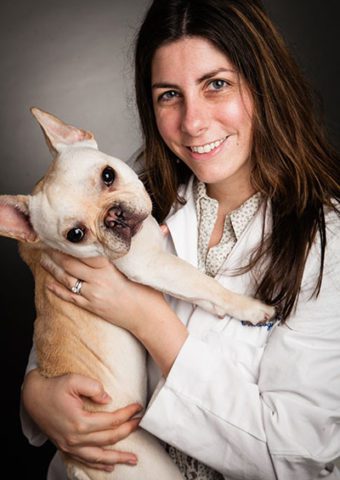Preparing for your first vet oncology visit.
FAQs.
The main goal of your first oncology meeting is to exchange all of the information necessary to make the best decisions for your pet. Each individual patient is unique, so your medical team will work closely with you to develop the most effective, custom treatment plan for your pet’s needs. Your oncologist will give you all of the information you need to know about your pet’s specific cancer and the array of treatment options available.
Between the information you provide about your pet’s lifestyle and circumstances leading up to his/her diagnosis, as well as the knowledge you gain from this initial visit regarding treatment options and prognosis, you and your pet’s medical team can begin to develop a tailored treatment path for your pet.
Your meeting will likely last about one hour. It is best to block off at least 90 minutes of time for your appointment.
It’s most important that you bring your pet! Your pet’s comfort and quality of life is the top priority of a veterinary oncologist. By meeting face-to-face, your oncologist can build a relationship with your pet and personally assess his or her physical condition. The physical examination performed at an initial visit provides invaluable information to your oncologist which may factor into treatment recommendations or clinical decision-making going forward.
Aside from your pet, it is a good idea when possible to bring detailed notes summarizing any behavioral or physical changes you may notice at home, as well as specific questions that you may have for your oncologist. Even subtle changes in routine or behavior can provide very important information. Nobody knows your pet better than you, so it is important to help provide insight to your veterinary oncologist.
You may be asked to bring a copy of your pet’s medical records, particularly if further testing has been done or new test results are available since your last visit with your primary veterinarian, however this information is usually provided by the family veterinarian beforehand.
Absolutely! The most effective cancer treatment involves collaboration from your pet’s entire medical team, especially the primary veterinarian. After your appointment, your oncologist will send your primary veterinarian a detailed report and begin establishing a partnership and plan for treating your pet.
Because all cancer cases are unique, sometimes other veterinary specialists (such as surgeons, dermatologists and internists) may be involved in oncological treatment. If your pet’s oncologist believes your pet could benefit from the help of another specialist, he or she may discuss this with you during your first appointment.
In some cases, a veterinary radiologist may be called upon to help pinpoint more information about your pet’s specific cancer (e.g., staging the extent of disease within your pet’s body with various imaging tests).
Yes. Veterinary oncologists understand that finances are an important part of decision-making and choosing amongst various treatment options. You will be provided with an itemized list of price estimates for all possible treatment options.
It’s up to you! After your appointment, you will receive a written summary of your discussion from your veterinary oncologist. If you would like to take additional notes, you are more than welcome to.
Depending on the diagnostic tests already performed, additional diagnostics may be discussed to help make the best assessment and treatment plan for your pet.
Possibly. While there is no imperative to perform any treatments at the first visit, if your oncologist deems it appropriate and you would like to begin treatment as soon as possible, in most cases your oncologist will be able to get started right away.
“Understand that information and communication are power,” says Dr. Britton. “If you are well informed, you are well-equipped to make the best decisions for your pet. There are no ‘wrong’ decisions as long as there is open communication between you and your medical team, and provided your pet’s quality of life is kept at the forefront of the conversation throughout treatment.
Trust in your veterinary oncologist, an open mind, and the assurance that your medical team is always working on you and your pet’s behalf, are key to making your first visit and those to follow the best experience possible for you and your pet.”
